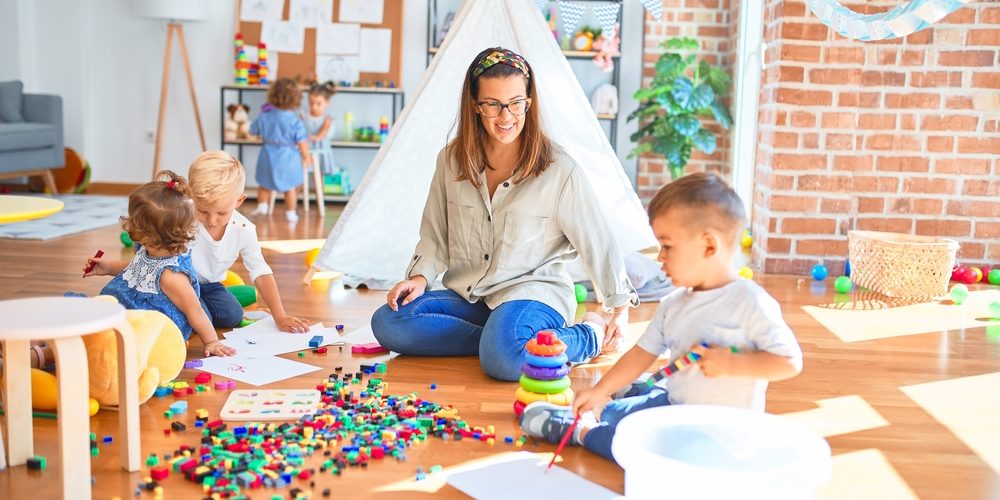The typical daycare will care for your toddler and keep them safe, but do those kinds of programs provide room for growth? Even at 2 or 3 years old, children have untapped potential for development; they actively explore the world, hoping to understand it better. In a Montessori school, a toddler’s Sensitive Periods are taken into account, and they receive a practical approach to their entire development.
Is Montessori a Good Choice for Toddlers?
Montessori is not just a good choice, it is a wonderful choice for young children. The Montessori Method is extremely effective at observing and recognizing a child’s growth and development. Whenever a child enters a new Sensitive Period, the Montessori teacher is there to provide them with a new task to help a child acquire certain abilities.
During the toddler years, there are four Sensitive Periods that the Montessori curriculum nurtures:
- Small Objects: Children become sensitive to grasping objects and small details
- Language: Children gain the ability to make noises and speak; they are interested in grammar and work on building increasingly difficult sentence structures to express themselves
- Movement: Toddlers move through stages of movement, from toddling to walking, and gain other fine motor skills; they work on increasing dexterity and balance
- Order: Children yearn for routine and structure in their lives; they become aware of Cause vs Effect, and they start making connections
- Music: Around 3 years old, children develop an interest in music—the pitch, melody, and rhythm
In a Montessori classroom, nothing has been left unaccounted for. The environment, the materials, and the lessons are crafted based upon the skills and development of the individual. Children are guided according to their growth and Sensitive Periods, so they become well-rounded people with emotional, academic, and social prowess.
What Do Toddlers Learn at Montessori School?
In Montessori schools, the toddler program generally ranges between 18 months and 3 years old. The toddler curriculum is designed to support children as they search for independence and competence. Children are given opportunities to develop their language skills, as the adults in the room use proper language with a rich vocabulary. The teachers also aid the children in speaking with one another and work on Grace and Courtesy at the same time.
The toddler program enables children to choose their activities and how they wish to work—either with others or alone. Additionally, they can explore the environment. Self-care and hygiene is practiced, such as learning how to wash one’s hands or wipe their own nose. Napping spaces allow children to decide when they are tired and want to lie down, as well.
To further independence and confidence, the toddler program also introduces the use of the kitchen space. Children can prepare snacks and serve others at child-sized furnishings.
The Classroom Environment for Toddlers
The Prepared Environment is crucial for toddler development. The Montessori classroom gives the child an enriched environment that is also calm and organized. Soft rugs, books, child-sized furniture, and an assortment of Montessori materials are prepared in such a way that every child can find a comfortable place to work.
All of the equipment in the classroom ensures that the children can improve their fine motor skills and sense of independence. For instance, there are railings and ladders for children who are mastering the art of walking. Child-sized utensils and tools assist with the completion of activities and boost confidence.
Teachers move throughout the space, observing and providing assistance when needed. Whenever a teacher speaks to a child, they get to their level to show that they respect them. The teachers add to the calm atmosphere by speaking in a relaxed and patient manner.
Toddlers Have Blocks of Uninterrupted Learning
Anyone who has observed a toddler will understand that rigidity does not serve them. This is why traditional daycare programs can be difficult for them—as soon as they begin to settle and focus on an activity, they are pulled away from it.
Rather than imposing an inflexible classroom where everyone has to do the same thing or be directed by the teacher constantly, toddlers in a Montessori school are given uninterrupted periods to work and play. Having these long periods helps develop intrinsic motivation, concentration, and a love of learning.
Final Thoughts
Montessori is a practical approach to toddler development. Not only does the Montessori Method account for a toddler’s need for independence and order, it also provides a classroom that gives them endless opportunities to practice valuable life skills.
Interested in a toddler program for your child? We welcome you at Fishtown Montessori, a premier Montessori school in Philadelphia. Sign up for a virtual tour today to see our beautiful classrooms and meet our incredible staff.






